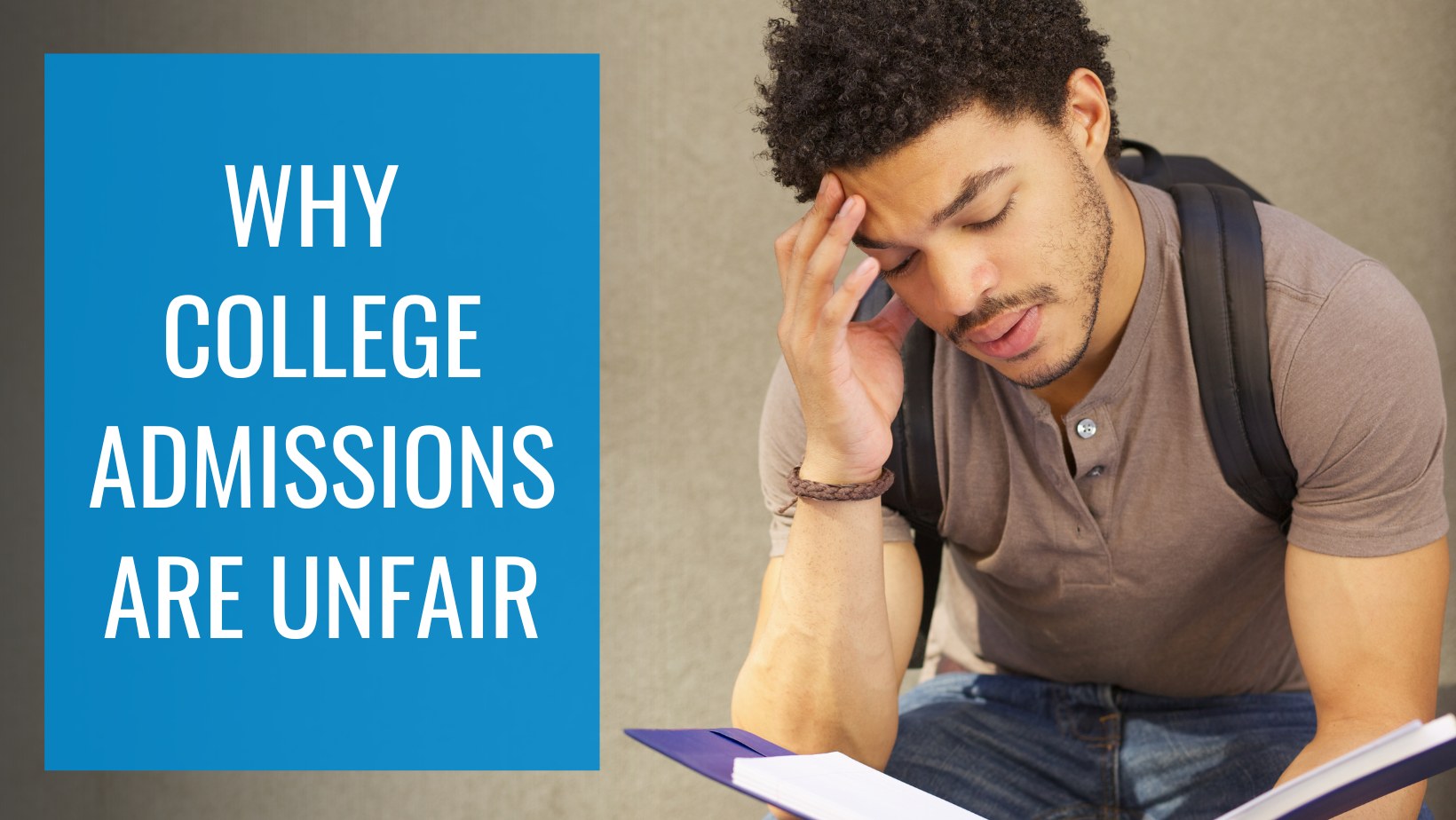Let’s start by addressing the elephant in the room: College Admissions are unfair. Yep, we said it.
In this article, we will outline some of the historical reasons for that, and also describe ways in which you (and all students) can submit your strongest applications within this context.
This Article Will Discuss The Following:

Imagine you have voluntarily signed up to run a short but intense 100-meter race with 9 others the same age as you. The race begins Saturday at 10:00 am, and everyone lines up on the track. Right before the race begins, all 10 of you are lined up on the track, stretching, taking sips of water, casually chatting, and ready to go.
Just then, a race official, in fact, the most senior race official from The Committee on Racing, the one with ultimate authority, comes to the track and announces that your parents’ income will be one factor in determining who wins this race. You and your 9 fellow competitors are all stunned by the announcement, “Wait? What?!” Looking around, you exchange stunned glances with the other participants.
You’re thinking: Why would something we all have zero control over influence this race between us, as peers? Together, you talk to the other participants and collectively shout “This race is about US, not our parents!”
The race official laughs and pauses to address you and the 9 other competitors: “You all are right about one thing,” the official begins, “this race is definitely not about your parents. But you are wrong to assume the race has anything to do with you at all. You see, ”continues the official, “This race has been carefully designed by The Committee on Racing and the sole purpose of The Committee on Racing is to ensure that The Committee on Racing continues on forever, so really, the race has nothing to do with any of you at all.”

You and the other 9 competitors are somewhat confused, you all enjoy running, you’re here, you want to participate and it’s really the only opportunity you have to race at all, so, despite your confusion over the process, you all decide to run the race anyway.
If you haven’t already guessed, college admissions is The Race in this analogy. The Committee on Racing is the Admissions Office of every selective and highly selective college in the country. Just like the most senior race official, the Deans of Admission at colleges have one job: To ensure the Committee on Racing is successful. To first understand why college admissions are unfair, you need to understand and accept this one cold hard fact:
College admissions never have been and never will be about you and your goals, it is always about the colleges and their goals. Failure to recognize this leads to far too much angst and many mistakes within the admissions process.
When things align, and you receive an admission letter, it’s rare for someone to question why. When a student is either denied or waitlisted, the question of “why” can haunt a student and family for weeks or months.
Accepting that the college admissions process is not about you but about the colleges can assist in understanding why the process is unfair to you; because despite what the colleges want you to believe, the process was not designed for you, it was designed by colleges for colleges.
Accepting this fact can assist you in making smart choices in the college admissions process. This mindset will also help you in detaching yourself from any personal feelings in the process.
With the analogy set and a clear understanding that the college admissions process is unfair, we will continue with our seemingly far-fetched analogy of The Race, and explore specific ways the unfairness can play out within the college admissions process.
Standardized Testing
One of the more prominent ways college admissions is unfair is through standardized testing. While the pandemic temporarily waived the testing requirement at highly selective colleges, very few highly selective colleges will continue to waive the requirement.

At many selective and highly selective universities, standardized testing is strongly correlated with first-year retention rates (the rate of students who return from freshman year to start sophomore year) and also 6-year graduation rates.
These are important metrics for all universities, so while it may be unfair to use this metric to you because it is a metric that colleges can use to their advantage, they do. One way SAT scores, retention rates, and 6-year graduation rates are used is as part of the formula for the infamous US News and World Reports ranking of US colleges.
Historically, a higher ranking by US News for a university means higher alumni donations, which lead to more resources for students, which often leads to more applications, which leads to The Committee on Racing The Admissions Office, always pushing for ever-higher SAT scores, or, at a bare minimum, not letting them drop below the current average.
At this point, you may be wondering If the colleges can all justify using the SAT or ACT as a metric through data, how is that unfair to students? Everyone can study as much as they want, right?
Parental Income
Unfortunately, the strongest predictor of how a student will perform on standardized testing is parental income. Just like using your parents’ income as a factor in determining the winner of the foot race, it is similarly unfair to you to use ACTs or SATs as a factor in determining college admissions.

Students have no control over parental income, yet it is highly correlated to standardized testing results, which, as we know, testing is an important part of admissions decisions, especially at Ivy League and other highly selective institutions. There is much research to support the income and score correlation.
The Washington Post has even written an article titled “These Four Charts Show How The SATs Favors Rich, Educated Families”. There are similar differences in scores based on familial income for the ACTs, which you can review in The ACT Composite by Family Income Report.
College Admissions offices use the metric of testing not because it is fair to students but because it is in the college’s best interest to use the metric for the reasons previously outlined. Remember, college admissions are not about being fair to you; the college admissions process is designed to serve the colleges.
Standardized testing is just one of the many ways college admissions are unfair to students. Another controversial way college admissions are unfair is through the extensive use many families make of private college consultants for essays, activities, resume building, interview prep, and more.
Testing Deserts
Another predictor of how a student will perform on standardized testing is their proximity to a testing location. Just like parental income, a student cannot control where their house is located, which is an important factor when it comes to access to standardized testing. Students across the country have to register for these tests months in advance just to find out that their local testing site is completely booked. This leaves thousands of students stranded, having to travel hours, sometimes even over state lines, just to be able to take a test. In some cases, families are even having to spend additional money on hotel rooms and transportation. But what about the students who cannot afford to travel these distances or stay in a hotel just to take an SAT?
Not only does this issue of access hurt students’ ability to take the SAT, but it also negatively affects their performance on the test itself. Imagine the fatigue of not being able to sleep in your own bed the night before one of the most important tests in your life. For students unable to stay in a hotel, they might have to wake up hours earlier just to get to their testing site on time which takes away from the amount of rest and mental preparation that they need. The San Francisco Chronicle has even written an article titled “Bay Area students are competing just to take the SAT. Here’s why the test has gotten more stressful,” which explains the effects of access to testing in California. They say that fewer than half of the schools that were testing centers pre-pandemic have returned, and pop-up testing centers are being set up to combat this shortage of testing sites. While this article addresses California’s struggle with standardized testing access, this is something plaguing students across the country. Being told that a test score is required to apply to certain colleges while having such a lack of access to that test is incredibly unfair to students, especially those in testing deserts.
Getting Help From A College Consultant
Many private college consultants have experience as admissions officers at selective and highly selective colleges. With a professionally trained admissions officer reviewing and advising on every nuanced aspect of an application, including essay direction and editing, students whose families make use of these services often have what many would consider an “unfair” advantage in the process.

If you and the 9 other race participants showed up at 10:00 am on the same Saturday, the students most likely to prevail (or at least end up finishing in the top few spots) would be the ones who had worked closely with professional athletic coaches the years, months and weeks prior to the Saturday race.
The same is true of college applications; guided coaching and preparation yield stronger results.
Sources:
https://www.usnews.com/best-colleges
Originally published in September 2021, edited and updated by one of our admissions consultants before being republished in February 2025

Former Admissions Officer at Johns Hopkins University
Former Assistant Director of Admissions at St. Mary's College of Maryland
1 Year in Johns Hopkins University Admissions
2 Years in St. Mary's College of Maryland Admissions
3,500+ Applications Read and Evaluated
After graduating with his BS in Economics from St. Mary's College of Maryland, Anoi spent 3 years reading domestic and international applications for his alma mater and Johns Hopkins University.



